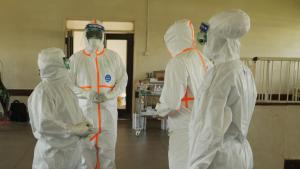WHO provides additional $2 million for Ebola response in Uganda
The Government of Uganda in collaboration with the World Health Organization ( WHO) and partners continue to scale up response efforts to contain the current Ebola outbreak. WHO continues to deploy additional critical resources in support of the Ugandan government’s against the Sudan virus disease outbreak. Following an initial USD$1 million allocation in January, WHO is releasing an additional USD$2 million from its Contingency Fund for Emergencies to strengthen response activities, including coordination, surveillance, laboratory support, infection prevention and control in hospitals and treatment centres, logistics, risk communication and community engagement and research.
“To further support Uganda’s response to the Ebola outbreak, I am releasing an additional $2 million from the WHO Contingency Fund for Emergencies,” said Dr. Tedros Adhanom Ghebreyesus, WHO Director-General. “Our teams are on the ground working with Ministry of Health and other partners to curb the spread of the virus.”
Uganda confirmed the outbreak of Sudan Ebola virus disease on 30 January 2025 after a laboratory diagnosis in a patient from Kampala. Since then, the Ministry of Health has reported nine confirmed cases, including one death. Seven patients are receiving treatment at Mulago National Referral Hospital, while one is being treated at Mbale Regional Referral Hospital. There has been no new confirmed case of Ebola reported since the last case that was confirmed on 8 February 2025. “To contain the spread of the virus, we have intensified surveillance, strengthened risk communication, and enhanced community engagement,” said Dr Kasonde Mwinga, WHO Representative to Uganda.
WHO is providing comprehensive support to the Ugandan government in several key areas. The organization is enhancing surveillance to quickly identify and isolate new cases, assisting with contact tracing, and facilitating timely laboratory testing to ensure accurate diagnosis. WHO is also supporting infection prevention and control efforts to minimize further spread in health facilities and treatment centres. Additionally, WHO teams are providing support with the management of cases in the Ebola treatment units through the provision of drugs and supplies, deployment of medical teams as well as vaccination of contacts and leading health communication efforts to engage communities in preventive actions.
“We welcome the prompt declaration of this outbreak by the Ministry of Health , and as a comprehensive response is being established, WHO is supporting the government and partners to scale up measures to identify cases, provide care, and curb the spread of the virus,” said Dr Matshidiso Moeti, WHO Regional Director for Africa.
Sudan virus disease, caused by the Orthoebolavirus Sudanese (Sudan virus), is a severe and often fatal illness with case fatality rates ranging from 41% to 100%. Uganda has had seven previous outbreaks, with the most recent occurring in 2022.
With ongoing support from WHO and partners, Uganda is mobilizing resources and expertise to rapidly contain the outbreak and protect the population.
Emergencies Communications Officer
WHO Africa Regional Office
nwonyec [at] who.int (nwonyec[at]who[dot]int)
+2348034645524
Communications Associate
WHO Uganda Country Office
Email: afwcougcom [at] who.int (afwcougcom[at]who[dot]int)
Phone: +256740487734
